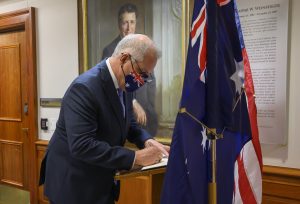As someone with a history of quoting American presidents, Australian Prime Minister Scott Morrison would recognize Reagan’s famous line, “You and I have a rendezvous with destiny.” But what exactly is destiny for Morrison? If it is to be a triumphant re-election in 2022, he must confront an unavoidable geopolitical issue that has played a role in felling numerous prime ministers past.
Over the past decade, climate change and energy policy have played a decisive role in Australian political futures. As result, it has largely remained a muddied and carefully managed political matter. But with a federal election over the horizon, Morrison and his diplomats must navigate a series of international gatherings that risk awaking the proverbial kraken of Australian politics.
It’s widely acknowledged that a lack of greater commitment on climate change will risk further undermining Australia’s international reputation, already significantly tainted by a perception of inaction. However, while many Australians favor greater action on climate change, those fervently opposed continue to threaten the stability of the federal government.
As a country that proudly positions itself a middle-power, Australia stands increasingly isolated on the international stage on this matter – CNN went as far a calling Australia as the possible “villain” of COP26, the U.N. climate conference scheduled for November. Any space provided by the previous Trump administration for Australia to abscond from responsibility has rapidly disappeared under new President Joe Biden.
The delicate dance has already begun, with the AUSMIN Joint Statement from September 16 showing a significant degree of conversation on climate change. The sidelines of this month’s United Nations General Assembly will also be used to build climate change consensus. U.K. Prime Minister Boris Johnson and U.N. Secretary-General Antonio Guterres co-hosted a climate change conference on September 22 involving China, the EU, India, and the U.S., among others. Australia was not invited to the meeting, at which Johnson accused “too many major economic” of “lagging too far behind” on climate action.
From there, things will only get trickier for Australia. On September 24, Morrison will have to navigate the first-ever Quad Leaders Summit at the White House. This is a significant gathering where the outcomes will be monitored around the world. In their press release, the White House singled out climate change as a key discussion point, a point that was contrastingly omitted from Morrison’s statement confirming the Quad meeting.
Even the momentous new defense pact, AUKUS, which is based on technology sharing between the U.S., U.K., and Australia may not be directly related to climate change but can’t be unpacked from it either. AUKUS will require Australia, the U.K., and U.S. to be collectively singing from the same hymn sheet on a variety of future issues, including the climate crisis.
Australia will stand naked on the international stage if it doesn’t make some concessions, but as one door closes, another may open. Global appetite for substantive climate reform remains plagued by diverging domestic political ambitions around the world, not just in Australia. COVID-19 has exacerbated the dividing lines between developed and developing countries, compounded by asymmetric economic recoveries and the unequal and lethargic distribution of vaccinations.
Further, it’s increasingly unlikely that the United States and China will be able to isolate climate change as a matter for cooperation. U.S. Climate Special Envoy John Kerry has struggled to make any substantial breakthroughs with China and neither the U.S. or China will sacrifice their less environmentally friendly domestic industries on the alter of climate change at the cost of both domestic political blowback and the odds that the other will do the same. All this means that Australia may well again find the space to hide amongst the multilateral ordeal the lead-up to COP26 will likely be.
A master of shaping the political narrative, the Morrison government would be wise to adopt the policy narrative that Biden administration took with the appointment of John Kerry – one of national security.
As the special envoy for climate change, Kerry became the first person solely focused on climate on the National Security Council, marking the issue as central to the national security of the United States and its broader geopolitical strategy. This can soften a vital political transition to great climate change commitment for the government.
This year’s AUSMIN Statement showed some steps being taken to deepen climate coordination through this lens. It included a statement “acknowledging the global security threat posed by climate change” and stated that the U.S. Department of Defense will share its Defense Climate Assessment Tool with Australia.
Domestic political considerations will dictate Australia’s policy footing at COP26. Navigating the litany of international meetings and summits ahead is a challenge that stands between Morrison and what he wants to be his destiny.
































